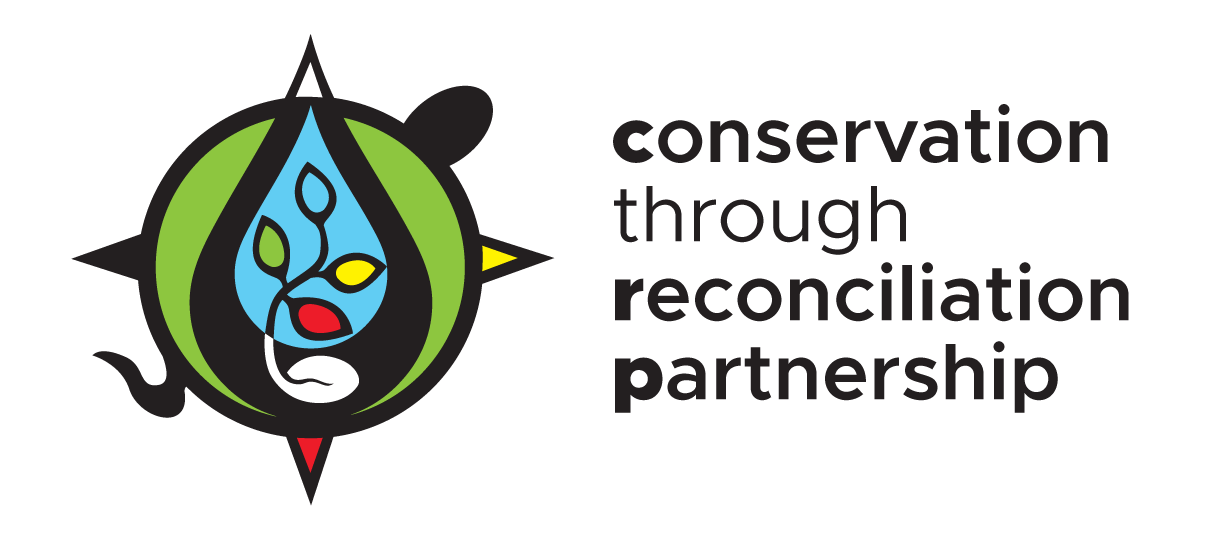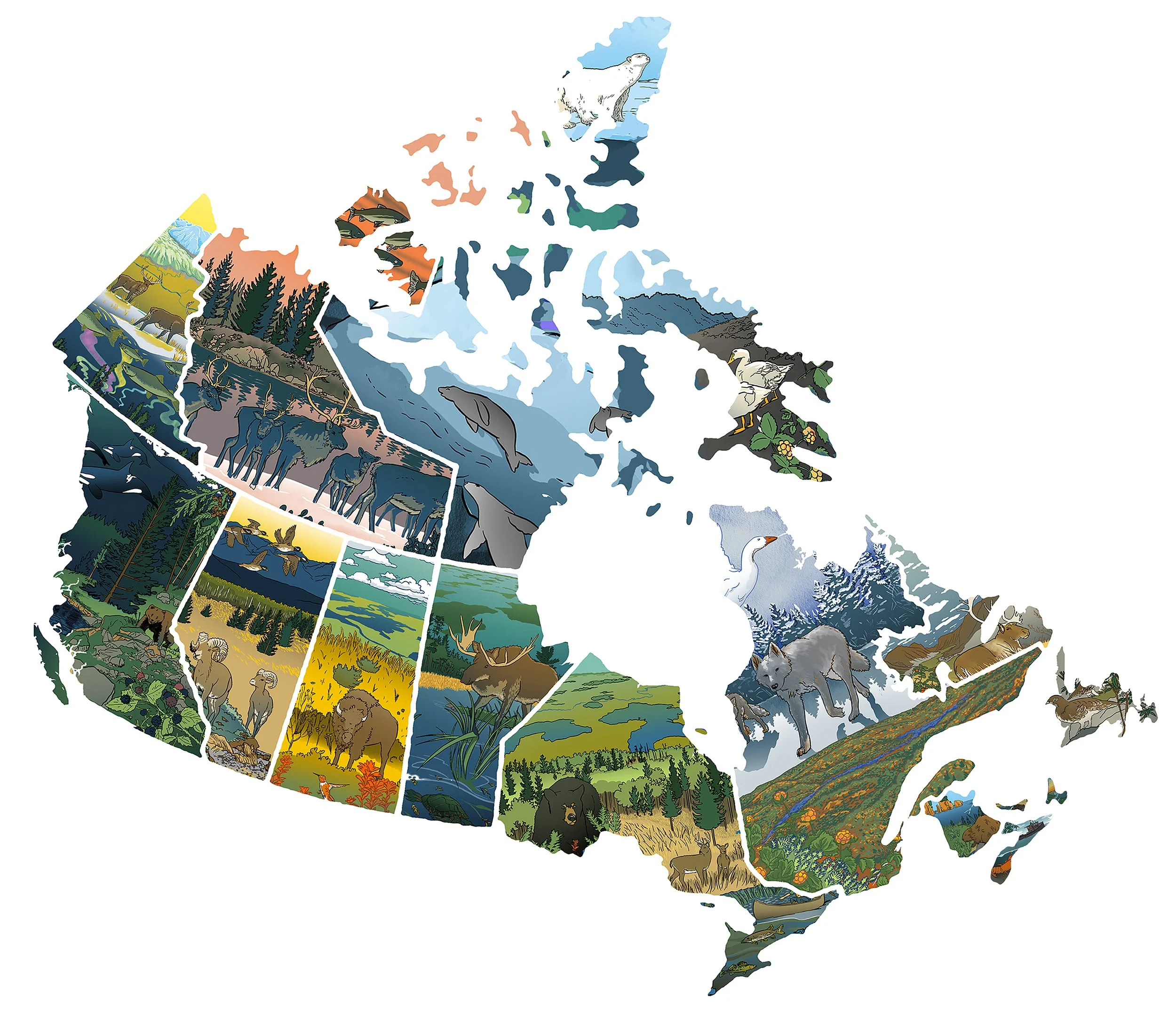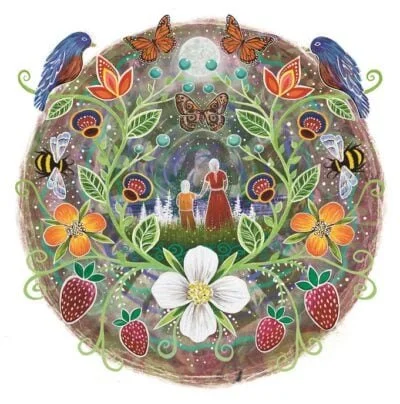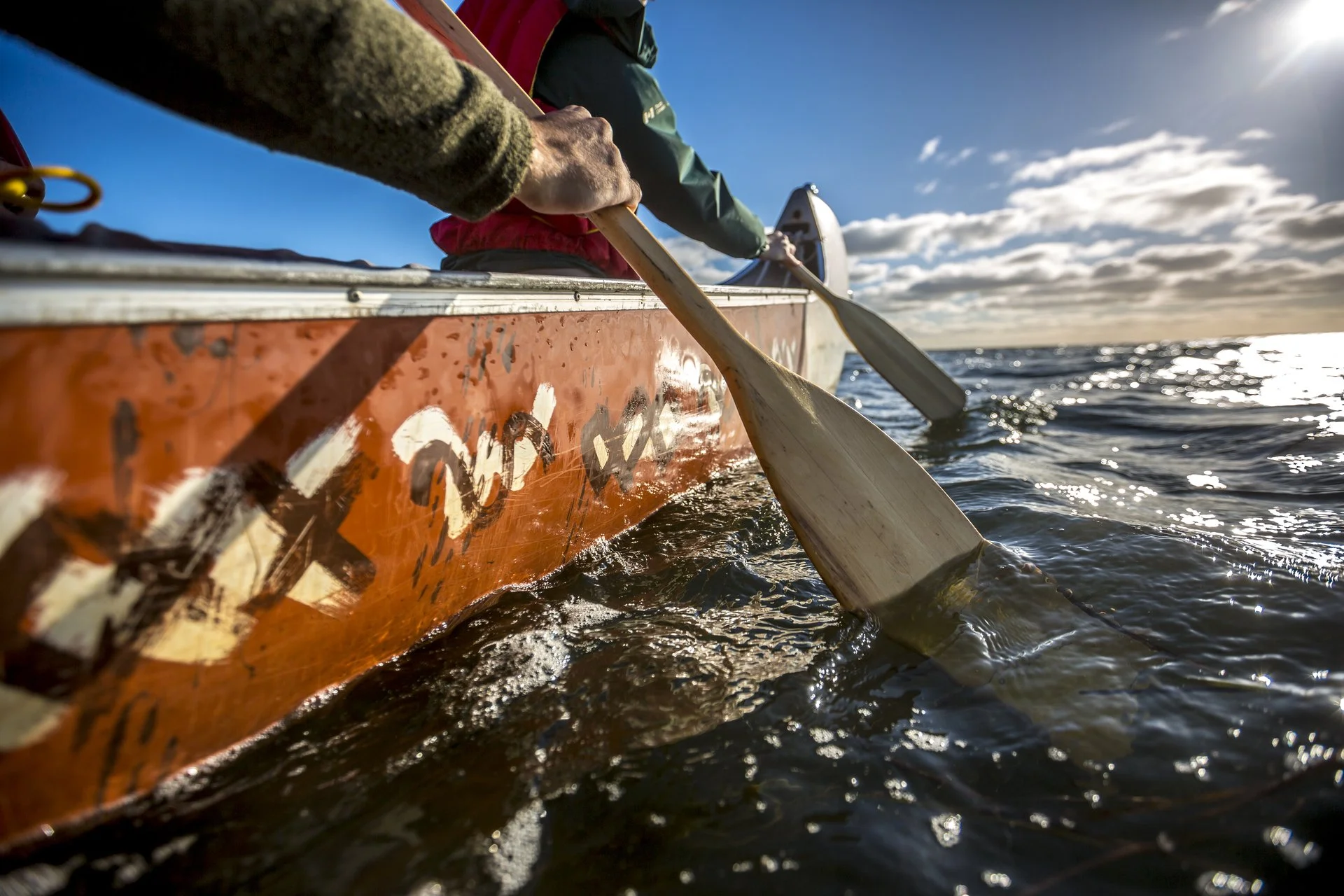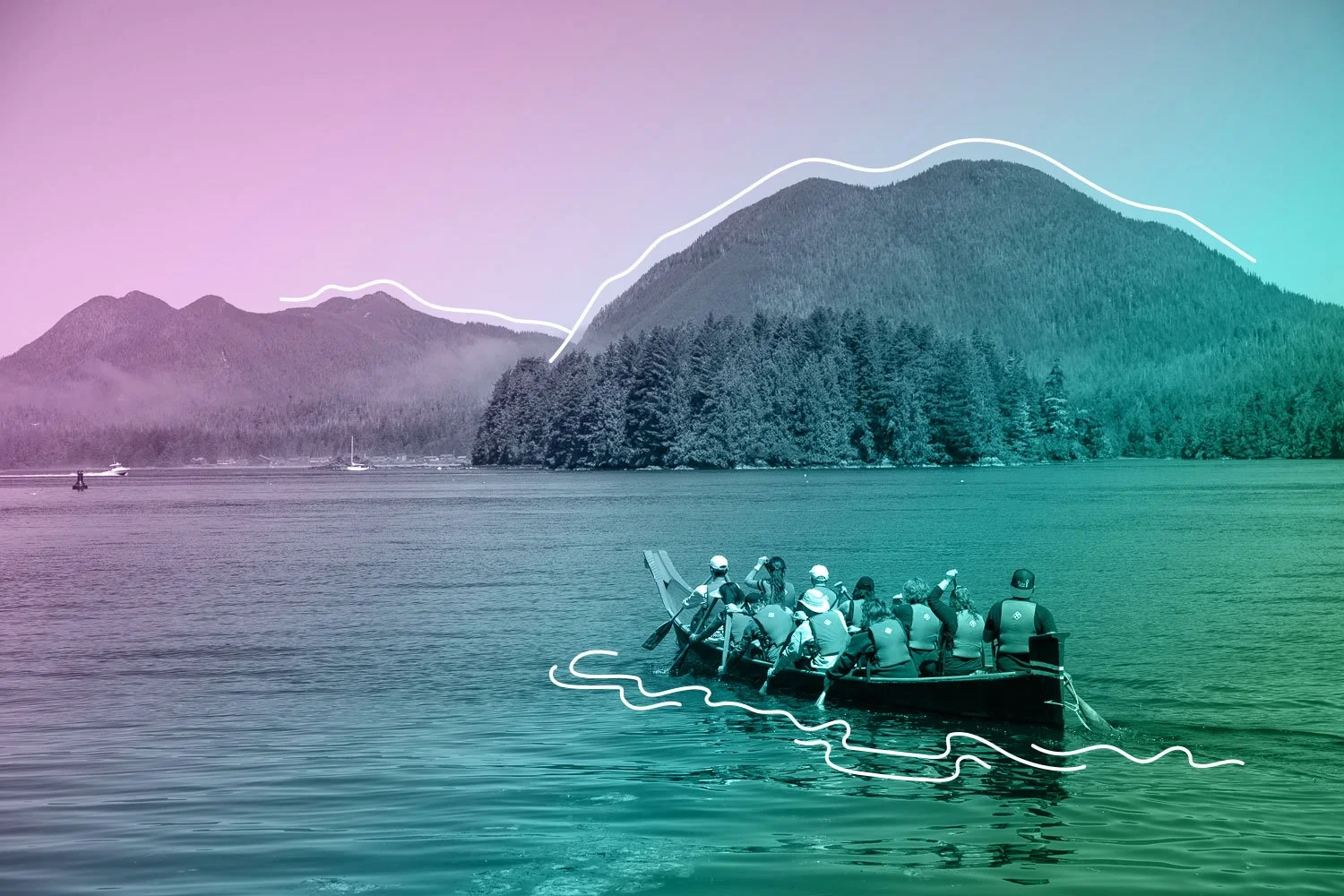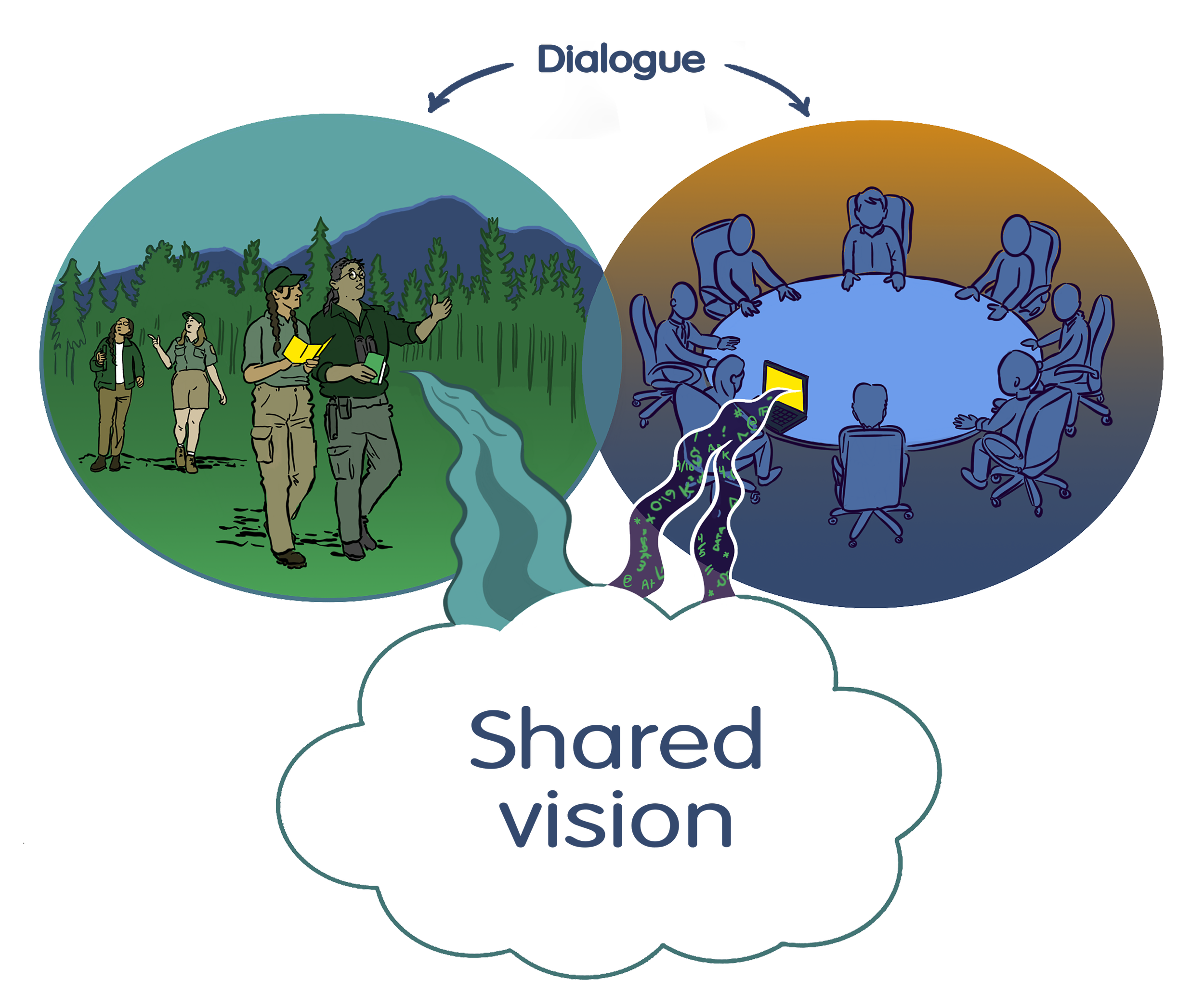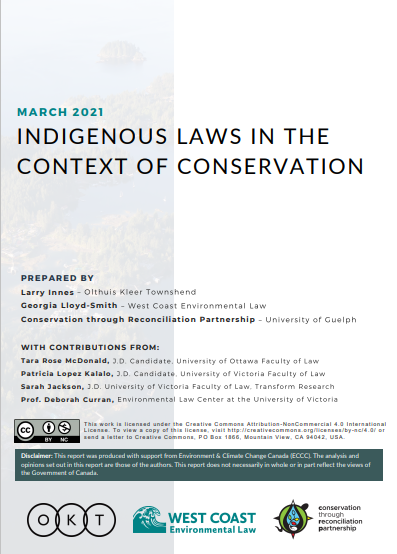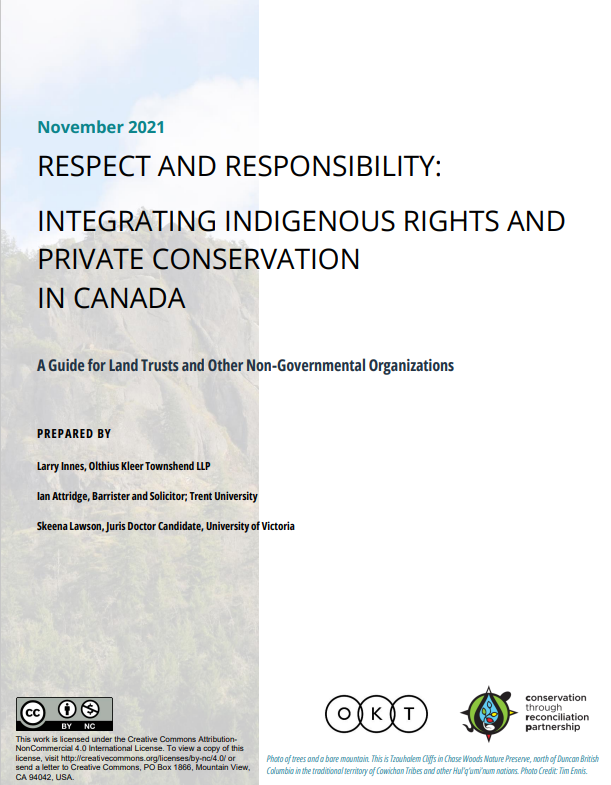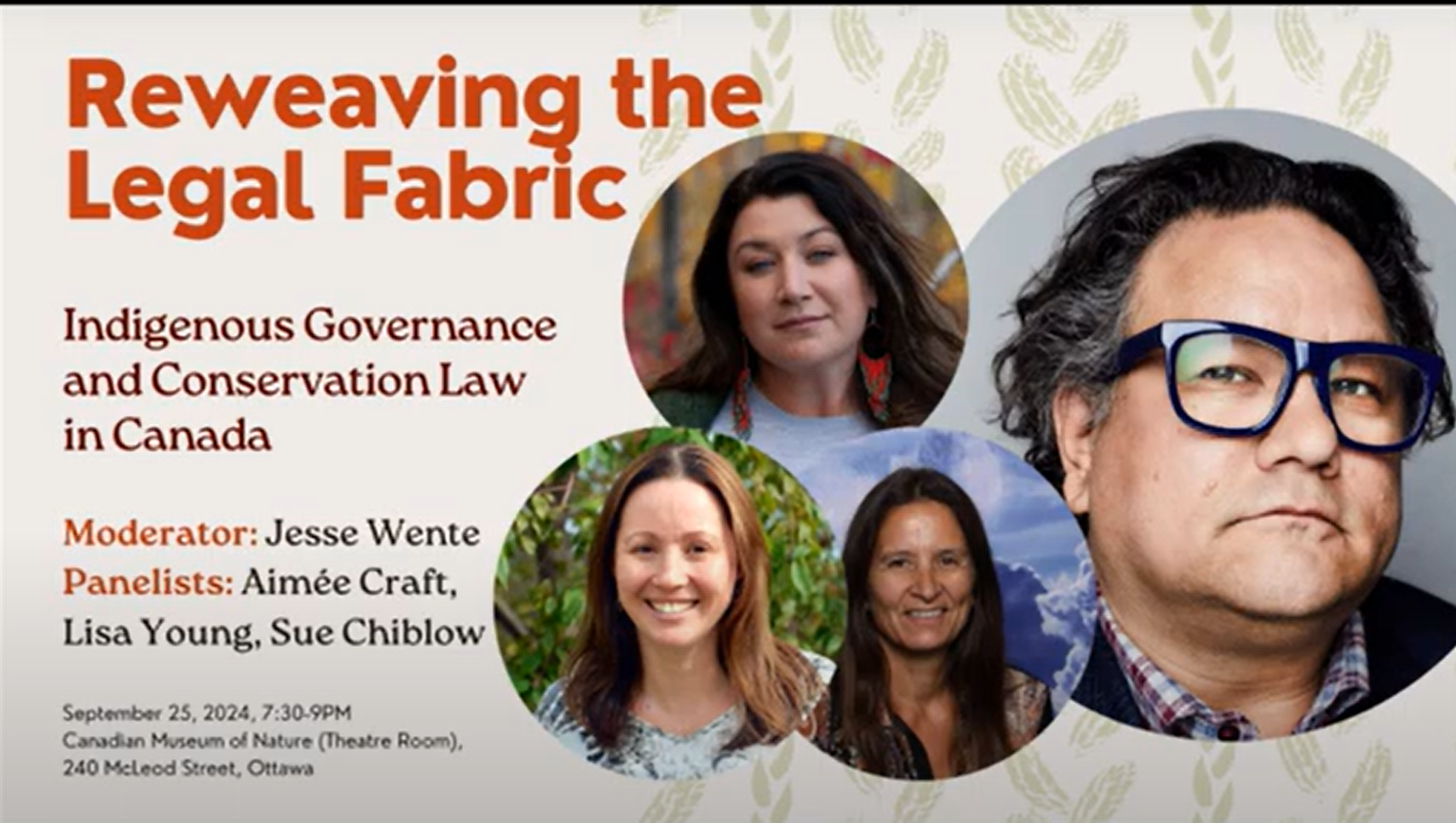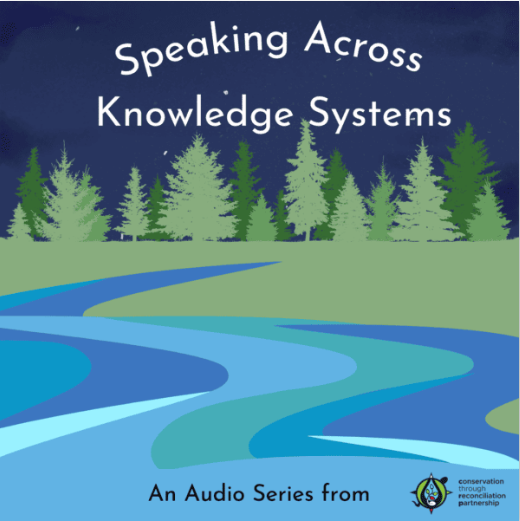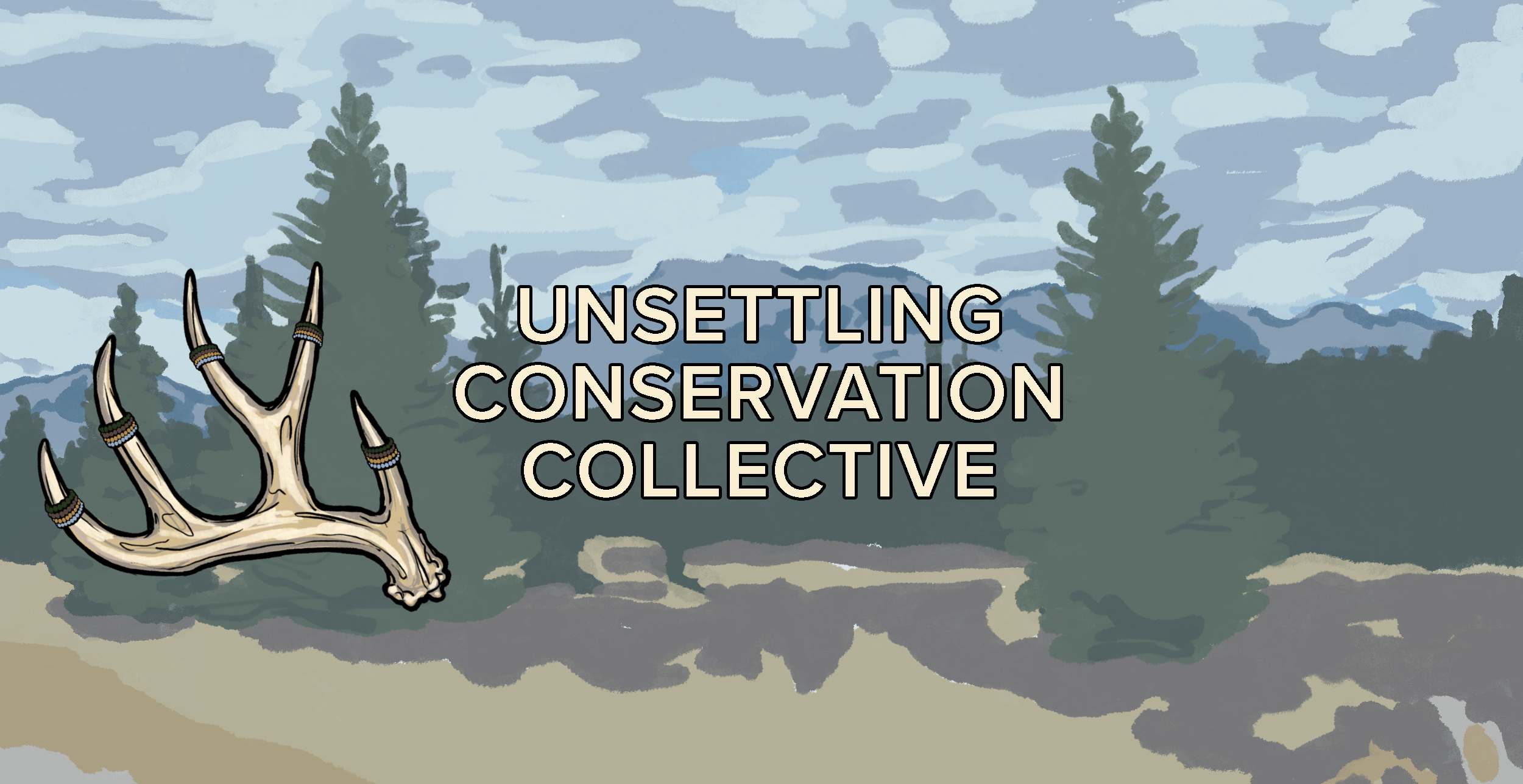A Review of Crown Legislation for Protected and Conserved Areas in Canada: A Guide for Indigenous Leadership
This guide provides an overview of Canadian federal, provincial, and territorial legislation for the creation of protected areas and parks. It is intended to inform Indigenous governments interested in advancing Indigenous Protected and Conserved Areas (IPCAs) through the Canadian legal system . This guide outlines potential pathways for reaching agreements on establishing IPCAs that complement federal, provincial, or territorial protected or conserved area designations. It was prepared by Victoria Kacer with contributions from Leora Gansworth, Larry Innes, Kerry Lee Cormier, Kelsey Scarfone, Ian Attridge, and Matthew Green.
balancing the narrative: communications guidelines for Indigenous-led conservation
These guidelines offer anti-oppressive practices, considerations, and approaches for communicating with and about Indigenous conservation leadership within the Canadian context. This document serves as a framework for co-developing communications strategies, approaches, and content with First Nations, Inuit, and Métis partners in a respectful, reciprocal, and responsible manner.
These guidelines attempt to shed light on the enduring impacts of colonialism. They also aim to encourage relationship-building based on reconciliation, trust, respect, equity, open dialogue, integrity, and mutual accountability. These guidelines are the result of a collaborative effort rooted in the principles of relationships, respect, responsibility, and reciprocity. and a commitment to support Indigenous-led conservation. They were developed through the collective vision and efforts of the Conservation through Reconciliation Partnership’s Communications Learning Circle.
Building Public Understanding of Indigenous-led Conservation: Insights from Communications Strategies in Five National Parks
This report outlines lessons learned in building public support for Indigenous-led conservation efforts. It highlights the communications tools that the conservation sector can use to change public attitudes about Indigenous-led conservation. This includes conflict resolution approaches, particularly in relation to issues such as Indigenous harvesting activities within and around state-led conservation areas. This report was prepared by Dawn Dietrich with Unama’ki Institute of Natural Resources and Kwilmu’kw Maw-klusuaqn.This work was produced with support from Parks Canada Agency.
Elevating Indigenous governance and Leadership in Urban Parks: Possibilities, Challenges, and Pathways
The purpose of this report is to share key considerations and resources to support Indigenous Nations, governments, and organizations who may be contemplating Indigenous-led conservation initiatives in urbanized territories. The resource is intended to support Indigenous Nations and their governments in navigating a myriad of power imbalances as they reassert their self-determination and sovereignty in the face of ongoing settler colonial violence.
The report was authored by Robin Roth and Allison Bishop, with contributions from the participants who attended a two-day workshop hosted by the Conservation through Reconciliation Partnership and the National Urban Park Hub at the University of Windsor. This report was deeply enriched through several key informant interviews, as well as a thorough review by and contributions from three experts: Clint Jacobs, Peter Lariviere, and Doug Anderson. This report was made possible through funding provided by the Parks Canada Agency and the Social Sciences and Humanities Research Council.
Frequently Asked Questions About IPCAs
As the recognition and advancement of Indigenous Protected and Conserved Areas or IPCAs increases across what is now known as Canada, several questions are being asked about their creation, development, and management. The Frequently Asked Questions about IPCAs was created to help address this. It was developed through a close collaboration between the Conservation through Reconciliation Partnership, the IISAAK OLAM Foundation, and the Indigenous Leadership Initiative. It was prepared by Kristy Tomkinson with support from Robin Roth, Allison Bishop, Larry Innes, Emily Cousins, and Justine Townsend.
Giving in a Good Way: Transforming Colonial Funding Practices for Conservation
This report was developed by Sara Wilbur-Collins from a more extensive research paper requirement of the Master's of Conservation Leadership (MCL) program at the University of Guelph in 2022. The paper was centred around the voices of those who shared their perspectives on challenges related to meaningfully funding Indigenous-led efforts.
Indigenous-led Conservation Reading List
The Indigenous-led Conservation Reading List is an open-access bibliography that lists academic literature relevant to the Indigenous-led conservation movement. This includes literature relevant to Indigenous Protected and Conserved Areas (IPCAs, Canada), Indigenous Protected Areas (IPAs, global), Indigenous and Community Conserved Areas (ICCAs, global), or various forms of Indigenous-led co-governance mechanisms that elevate Indigenous rights, responsibilities, and legal traditions.
It was compiled and is managed by Megan Youdelis, Kim Tran, and Elizabeth Lunstrum with contributions from Allison Bishop, Victoria Hodson and Stacey Mortimer. The reading list is sponsored by the Conservation through Reconciliation Partnership; Canadian Conservation in Global Context; National Science Foundation, Project #2117652; Boise State University; University of Guelph; York University; Social Sciences and Humanities Research Council of Canada.
IPCA Creation Guide
The IPCA Creation Guide was created to support Indigenous Nations (First Nations, Métis, Inuit) to establish Indigenous Protected and Conserved Areas (IPCAs). The guide includes questions and examples for visioning and planning, but is not meant to be directive. It includes some examples that are not specific to IPCAs but that might be helpful. The lead author was Justine Townsend. The artwork is from Nicole Marie Burton.
IPCA Governance Models: A Snapshot of Existing Conservation Governance Arrangements
This resource is intended for Indigenous Nations and governments who are interested or currently engaged in the creation of an Indigenous Protected and Conserved Area (IPCA) or other Indigenous-led conservation initiatives. It provides a snapshot of how IPCAs are being governed across what is now known as Canada. It was prepared by Megan Youdelis with contributions from Eli Enns and Terry Dorward (Tla-o-qui-aht Tribal Parks); Justine Townsend, Jonaki Bhattacharyya, Roger William, and Russell Myers Ross (Dasiqox-Nexwagwez?an); Kerri Garner (Qat’muk); Steven Nitah (Thaidene Nëné); Martin Lougheed and Judy Rowell (Tongait KakKasuangita SilakKijapvinga / Torngat Mountains National Park); and Chantal Tetreault (Eeyou Istchee Protected Area Network).
Land Trusts and Indigenous Peoples: The Canadian Context
Land trust models offer potential opportunities for Indigenous Peoples to reclaim lands lost through ongoing dispossession. Having a land trust organization allows a group to accept the donation of lands and money and manage them according to the mandate of the land trust. This may be a particularly important tool for Indigenous Peoples whose traditional lands have a high percentage of private property.
Indigenous Peoples continue pursuing avenues of self-determination to fulfill their responsibilities to current and future generations. Land trust models are potentially innovative approaches that may be more flexible than they first appear. Those seeking this model, those seeking access to land and opportunity, may find collaboration and inspiration, but also constraint.
The purpose of this document is to offer considerations that can be taken up in different places according to the specific priorities of those involved. It was written by Kristi Leora Gansworth through a three-year collaboration between the Conservation through Reconciliation Partnership (CRP) and the Nature Conservancy of Canada.
Nature-based Solutions: Indigenous-led conservation and carbon storage in Canada
This report is a synopsis of a 2018-2019 research and engagement project entitled, Nature-Based Solutions: Indigenous-led Conservation and Carbon Storage in Canada. The purpose of this project was to explore the potential alignment of Indigenous-led conservation (i.e. conservation and stewardship led by Indigenous Peoples) and Indigenous-led (nature-based) carbon storage by centering Indigenous perspectives. The gathering strove to identify the opportunities, challenges, and priorities in the convergence of these two innovations in environmental governance. The report was authored by Justine Townsend and Mary-Kate Craig (Department of Geography, Geomatics and the Environment, University of Guelph) with support from Faisal Moola, Ben Bradshaw, Robin Roth, and Abigail Sparling (University of Guelph). The project was supported by the Metcalf Foundation, the Conservation through Reconciliation Partnership, the University of Guelph, Shared Value Solutions, Anwaatin Inc., and KAP Design.
Parks Canada Management Planning: A Guide for Indigenous Leadership
The purpose of this guide is to inform and support Indigenous governments as they engage with Parks Canada’s management planning process in its current form. While there are several types of agreements Indigenous governments can establish with Parks Canada, this guide focuses on management planning. This guide was developed by Kai Bruce (Concordia University) in collaboration with the CRP. It was created in a collaborative spirit with generous input from Peter Lariviere, Graham Dodds, Karen Haugen, and Emily Martin.
Report: Indigenous Laws in the Context of Conservation
To successfully build Nation-to-Nation and Crown-to-Inuit relationships that recognize and reconcile Crown and Indigenous jurisdictions and authorities, Indigenous Protected and Conserved Areas (IPCAs) governance arrangements must find ways to bring together Indigenous and Crown legal systems. This report examines SGaan Kinghlas-Bowie Seamount Marine Protected Area in Haida Gwaii and Thaidene Nëné in Łutsël K’é Dene First Nation territory as two contemporary examples of how Indigenous laws operate alongside Crown laws within IPCAs. The report makes recommendations for how mutual recognition of Indigenous and Crown jurisdictions throughout the establishment, management, and operation of IPCAs can advance effective conservation and provide a pathway for reconciliation. It was prepared by Larry Innes (Olthius Kleer Townshend), Georgia Lloyd-Smith (West Coast Environmental Law), and the Conservation through Reconciliation Partnership with contributions from Tara Rose McDonald, J.D. Candidate (University of Ottawa Faculty of Law), Patricia Lopez Kalalo, J.D. Candidate (University of Victoria Faculty of Law), Sarah Jackson, J.D. (University of Victoria Faculty of Law, Transform Research), Professor Deborah Curran (Environmental Law Centre at the University of Victoria).
Respect and Responsibility: Integrating Indigenous Rights and Private Conservation in Canada
This report provides guidance for private land conservation organizations seeking to adapt their practices and build respectful and appropriate relationships with Indigenous Nations. It is also an important tool for conservation organizations seeking to understand the legal and policy landscape that frames key relationships with Indigenous communities in Canada and abroad. It was prepared by
Larry Innes (Olthuis Kleer Townshend LLP), Ian Attridge (Barrister and Solicitor; Trent University), and Skeena Lawson (Juris Doctor Candidate, University of Victoria). It was created with support from the Nature Conservancy of Canada and the Conservation through Reconciliation Partnership.
Reweaving the Legal Fabric: Indigenous Governance and Conservation Law in Canada
On September 25, 2024, the David Suzuki Foundation hosted a panel called “Reweaving the Legal Fabric: Indigenous Governance and Conservation Law in Canada.” The event was a partnership between the David Suzuki Foundation, the University of Ottawa, Ecojustice, and the Conservation through Reconciliation Partnership. The event featured Victoria Watson, co-chair of the Reconciliation Working Group at Ecojustice; Kristen Boone, Dean of Common Law at the University of Ottawa; Jesse Wente, an Indigenous broadcaster and film critic, and panelists Aimée Craft (Associate Professor Faculty of Law, University of Ottawa and Anishinaabe-Métis lawyer from Treaty 1 territory, Manitoba), Lisa Young (Biologist & Executive Director of Unama’ki Institute of Natural Resources), and Sue Chiblow (Assistant Professor, School of Environmental Sciences’, University of Guelph & Environmental Policy Analyst).
Panelists shared stories and teachings about reconciliation, self-determination, and weaving Indigenous laws and knowledge into environmental conservation. Panelists also highlighted challenges, including colonial legal systems, a lack of understanding, and funding, but shared hopeful examples, such as Indigenous Protected and Conserved Areas (IPCAs) and cross-border water governance. The panel ended with a call to invest in Indigenous communities, honour the land and its treaties, and centre truth and knowledge as the path forward.
Speaking Across Knowledge Systems: A Podcast Series
Speaking Across Knowledge Systems is a series of conversations with Indigenous and non-Indigenous environmental science scholars and practitioners about how they approach, understand, and engage with diverse knowledge systems in their work. The podcast delves into the different paths to acquiring, respecting, and sharing knowledge, and how to move beyond a singular focus on Western ways of thinking and doing to achieve conservation goals.
This project was conceived by the Conservation through Reconciliation Partnership (CRP) Knowledge System Stream members and brought to life through the consideration, care, and diligence from Daniel de Kok, as host, editor, and lead producer of this podcast. We are grateful to the members of CRP’s Knowledge Systems Stream who generously shared their knowledge and for their thoughtfulness in sharing their expertise, learning, and reflections. They include: Dr. Deborah McGregor (Steam Lead), Jonaki Bhattacharyya, Karen Beazley, Nathan Cardinal, Soudeh Jamshidian, Dr. Gita Ljubicic, Allyson Menzies, Andrea Reid, Dr. Jennifer Silver, Jeji Varghese, and Barbara Moktthewenkwe Wall. The work of Kristy Tomkinson and Elena McCulloch in transcript editing, logistical support, and web development has been invaluable in executing the vision of this project.
Unsettling Conservation Collective
The Unsettling Conservation Collective is an Indigenous-led group of contemporary artists (Adrian Stimson, Glenn Gear, Melaw Nakehk’o, Michelle Wilson, and Sheri Osden Nault) who embarked on a year of land-based research and creation.
This project highlights how conservation has been, and in some cases continues to be, a tool for Indigenous dispossession. They created unique artwork and documented their community-engaged processes. The artwork showcases Indigenous Land and Water relations, governance, and the colonial forces that attempt to disrupt them.
The collectives’ artwork and mini-documentaries will be exhibited at the Art Gallery of Guelph starting in September 2025, and will be transformed into interactive exhibits on the IPCA Knowledge Basket.
